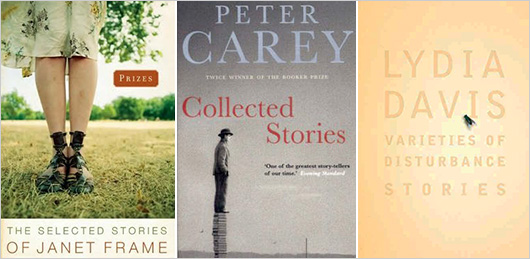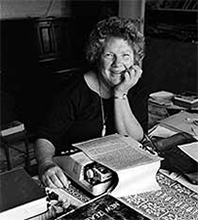In today’s Thursday Three, our weekly assortment of oddities in triplicate, please allow me to recommend to you (forcefully, but with love) three splendid short story collections. And for those of you about to head off on summer vacation, may I also point out that a volume of short stories makes for better holiday reading material than a novel. After all, beachy book time is always less plentiful than you imagine—there are naps to be napped, and so many drowning children to be rescued—and even if you manage to secure for yourself seventeen peaceful minutes, your concentration will be pretty much ruined by the constant urge to scratch at the mosquito bites on your ankles. You’re never going to get through a doorstopper like The Marriage Plot (you’re not missing much), but you can always sneak in a couple of short stories between spells of wilty heatstroke.

1. Prizes: The Selected Stories of Janet Frame. That cover! Lawks-a-lordy, what tosh! Apparently the design process went something like this:
Cover designer: Who do we have here? Janet Something? It’s a lady! Rightio. Ladies get pictures of shoes and legs. Add a dress and some feisty black sandals and we’re done!
Sensible person: Er, but Janet Frame isn’t exactly chick lit. She’s, like, a serious writer. People talked about her as a Nobel Prize contender.
Cover designer: Oh dear. I am completely at a loss now. Possibly I will have to abandon my tired old ways and completely rethink my approach to—oh wait, I’ve got it! I’ll make her legs a bit dirty and wrinkle her dress. Who’s a serious young lady now, hmm?
Ah well, I’ve seen worse. And although the cover may be a tad shite, the stories inside are brilliant. Here’s the opening paragraph of “Prizes,” which first appeared in a 1962 issue of the New Yorker:
Life is hell, but at least there are prizes. Or so one thought. One knew of the pit ahead, of the grownups lying there rewarded, arranged, and faded, who were so long ago bright as poppies. One learned to take one’s own deserved place on the edge, ready to leap, not to hang back in a status-free huddle where bodies were warm together and the future darkness seemed less frightening. Therefore, one learned to win prizes, to be surrounded in sleep by a dream of ordinal numbers, to stand in best clothes upon platforms in order to receive medals threaded upon black-and-gold ribbons, books “bound in calf,” scrolled certificates. One’s face became, from habit, incandescent with achievement.
Wonderful, yes? Israeli writer Etgar Keret, himself no slouch in the story-writing department, is a big Frame fan: he nominated her “My Last Story” for his Recommended Reading pick. Frame’s strange, beautiful stories are laced with gloomy nostalgia and the slyly hilarious observations of a weirdo genius. Perfect holiday reading if you’re going on a cruise with a bunch of relatives whom you loathe and feel superior to.
2. Peter Carey’s Collected Stories. One reviewer likens reading Carey’s stories to “being shot by a firing squad of angels,” and that’s a pretty apt description. As an example of death-by-beauty, here’s the final paragraph of “The Chance”:
But I, I’m a crazy old man, alone with his books and his beer and his dog. I have been a clerk and a pedlar and a seller of cars. I have been ignorant, and a scholar of note. Pock-marked and ugly I have wandered the streets and slept in the parks. I have been bankrupt and handsome and a splendid conman. I have been a river of poisonous silver mercury, without form or substance, yet I carry with me this one pain, this one yearning, that I love you, my lady, with all my heart. And on evenings when the water is calm and the birds dive amongst the white-bait, my eyes swell with tears as I think of you sitting on a chair beside me, weeping in a darkened room.
Carey has mastered the essential sci-fi writers’ trick: he presents his unlikely worlds with utter confidence, and we never think to question his logic or doubt his details. He shows us an America where shadows are sold in lavish boxes, and introduces us to an unhappy shepherd who must keep alive a flock of suicidal horses. And in my favorite story in the collection, “Do You Love Me?,” we meet the Cartographers, whose job it is to document a disappearing world where unloved people and places begin, quite literally, to fade away, “like the image on an improperly fixed photograph.”
3. Lydia Davis’ Varieties of Disturbance. Or any Lydia Davis short story collection. Take your pick. They’re all brilliant, funny, moving, and sublime. I picked Varieties of Disturbance because it has a fly on the cover, and because it contains the excellent “Kafka Cooks Dinner” (for Milena, naturally), the best Kafka story Kafka never wrote:
I know beet salad would be better. I could give her beets and potatoes both, and a slice of beef, if I include meat. Yet a good slice of beef does not require any side dish, it is best tasted alone, so the side dish could come before, in which case it would not be a side dish but an appetizer. Whatever I do, perhaps she will not think very highly of my effort, or perhaps she will be feeling a little ill to begin with and not stimulated by the sight of those beets. In the case of the first, I would be dreadfully ashamed, and in the case of the second, I would have no advice—how could I?—but just a simple question: would she want me to remove all the food from the table?
It ends with “Someone once said that I swim like a swan, but it was not a compliment.” (You can read the entire story online here.)
It would be impossible for me to overstate how much I admire and envy Lydia Davis’ prose. She is the best. She is just the best. If a literary genie jumped out of a gin bottle and offered me the chance to write like anyone alive, I would say, “Oh, make me Lydia Davis, please!” (And then I would sit down at my desk and write a devastating prose poem entitled “Paul Auster’s Hair.”) Here are two of her stories in their entirety, one funny (because she is the best at funny), and one sad (because she is the best at sad):
The Good Taste Contest
The husband and wife were competing in a Good Taste Contest judged by a jury of their peers, men and women of good taste, including a fabric designer, a rare-book dealer, a pastry cook, and a librarian. The wife was judged to have better taste in furniture, especially antique furniture. The husband was judged to have overall poor taste in lighting fixtures, tableware, and glassware. The wife was judged to have indifferent taste in window treatments, but the husband and wife both were judged to have good taste in floor coverings, bed linen, bath linen, large appliances, and small appliances. The husband was felt to have good taste in carpets, but only fair taste in upholstery fabrics. The husband was felt to have very good taste in both food and alcoholic beverages, while the wife had inconsistently good to poor taste in food. The husband had better taste in clothes than the wife though inconsistent taste in perfumes and colognes. While both husband and wife were judged to have no more than fair taste in garden design, they were judged to have good taste in number and variety of evergreens. The husband was felt to have excellent taste in roses but poor taste in bulbs. The wife was felt to have better taste in bulbs and generally good taste in shade plantings with the exception of hostas. The husband’s taste was felt to be good in garden furniture but only fair in ornamental planters. The wife’s taste was judged consistently poor in garden statuary. After a brief discussion, the judges gave the decision to the husband for his higher overall points score.
* * *
Head, Heart
Heart weeps.
Head tries to help heart.
Head tells heart how it is, again:
You will lose the ones you love. They will all go. But even the earth will go, someday.
Heart feels better, then.
But the words of head do not remain long in the ears of heart.
Heart is so new to this.
I want them back, says heart.
Head is all heart has.
Help, head. Help heart.
The texture of Janet Frame’s writing, often reminiscent of Joyce and the South American Clarice Lispector, can at times be a little thick, let’s face it, but the poetry in her language is always intact. This book compiles what are considered to be Frame’s ‘stories of the fantastic,’ in the faerie tale tradition of the dark and the morbid.


